From a message given April 10, 1999 in Milford, Connecticut.
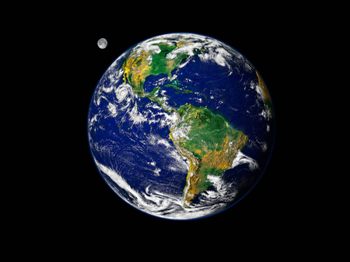
Earth and Moon from Space (NASA) [1]
Let us begin tonight by reading from Scripture what the Lord says about when He made this universe:
“Where were you when I laid the earth’s foundations?
Tell me, if you understand.
Who marked off its dimensions? Surely you know!
Who stretched a measuring line across it?
On what were its footings set,
or who laid its cornerstone—
while the morning stars sang together
and all the angels shouted for joy?
“Who shut up the sea behind doors
when it burst forth from the womb,
when I made the clouds its garment
and wrapped it in thick darkness,
when I fixed limits for it
and set its doors and bars in place,
when I said, ‘This far you may come and no farther;
here is where your proud waves halt’?
“Can you bind the beautiful Pleiades?
Can you loose the cords of Orion?
Can you bring forth the constellations in their seasons
or lead the Bear with its cubs?
Do you know the laws of the heavens?
Can you set up God’s Dominion over the earth?
“Can you raise your voice to the clouds
and cover yourself with a flood of water?
Do you send the lightning bolts on their way?
Do they report to you, ‘Here we are’?
Who endowed the heart with wisdom
or gave understanding to the mind?”
(Job 38:4-11, 31-36)
Then the Lord spoke to Job out of the storm:
“Brace yourself like a man;
I will question you,
and you shall answer me.”
(Job 40:6-7)
Step back with me for a moment… from all life’s little troubles and annoyances, from the distractions of the day now ending. Stop and consider—what an extraordinary universe we live in! What a marvel planet Earth is! As astronauts have pointed out looking back at our globe from high above, the Earth shines like a beautiful blue and white jewel hanging in the blackness of space. If you have ever visited the American Museum of Natural History in New York, you have probably seen the famous sapphire, the Star of India. It is an exquisite jewel, but how pitiful it’s beauty is compared to the wonder of our home in space.
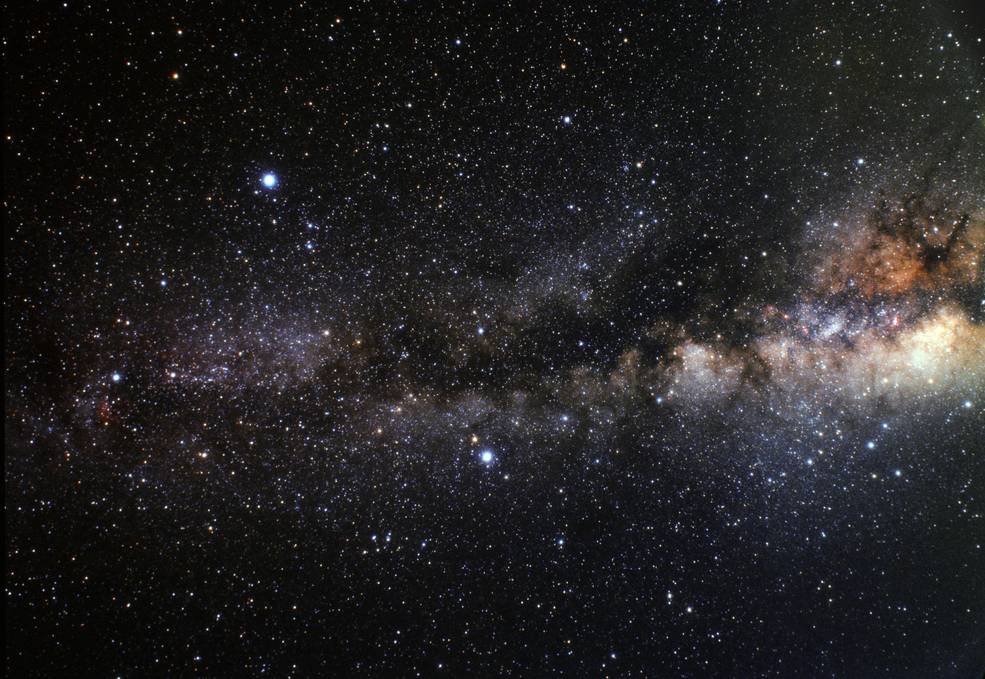
Photo of the Milky Way (NASA) [2]
Now, think back for a moment to the last time you looked up into the night sky and were dazzled by the brightness of the moon, or by the countless stars glittering above. Growing up as a boy in the country, I used to love to lie out in a field at night and look up—with no ground lights like we have in New York City obscuring the brightness of the heavens. But when we become adults, it is all too easy to forget the impressions such beauty made on us as children. No wonder John Dean, a White House official of Watergate scandal fame, was warned by his mother when he became a young man, “Take time to smell the flowers!” And no wonder Jesus warned us, “I tell you the truth, unless you change and become as little children, you will never enter the kingdom of heaven.” (Matthew 18) What a vast and remarkable universe surrounds us! Yet how often do we stop to ask, “Who made all these things? Why are we here?” Surely these questions are at least as important as what clothes we are going to wear tomorrow, or how we will provide for retirement!
Job was a man like us, who took great care about the daily needs of business and family. He was also active in the affairs of his community. More than 3,000 years ago, he had wealth, he had possessions, and he had children. But somewhere along the way, he lost perspective regarding what was most important—and pride crept in. A college friend once gave the best definition of humility I have ever heard: “Humility is seeing ourselves as we really are and seeing God as He really is.” God had to allow tragedy to break in upon Job’s busy life in order to get his attention, just as He has to do with many people today. Back in the 1980’s, few in Armero, Colombia had any interest in the Gospel of Jesus Christ until the volcano, Sierra del Nevada, erupted and buried 25,000 people in one night. Then, when evangelists went again to preach in the refugee camps, every person present raised their hand to receive Christ as their personal Lord and Savior.
Remains of Armero after destruction in 1985 [3]
Let us look again at God’s words to Job, “Where were you when I laid the earth’s foundations? Tell me, if you understand. Who marked off its dimensions? Surely you know! Who stretched a measuring line across it? On what were its footings set, or who laid its cornerstone—while the morning stars sang together and all the angels shouted for joy?” We humans seem to be so sure that we have everything figured out, modern scientists included. But one of the greatest shortcomings of men and women since time began has been our ignorance about what we do not know! Listen to the words of Albert Abraham Michelson, a famous scientist at the end of the 19th century, “The most important fundamental laws and facts of physical science have all been discovered, and these are now so firmly established that the possibility of their ever being supplemented in consequence of new discoveries is exceedingly remote.”[4]
Contrast Michelson’s words with those of Dr. Martha P. Haynes from a New York Times article dated January 26th of this year regarding scientists’ attempts to understand superclusters of galaxies: “Dr. Haynes had one of the few uncontested comments on superclusters. ‘We’re still trying,’ she said, ‘to learn the process of how these things formed.’” Or again from the Times Science Section of Tuesday of this week regarding scientists’ understanding of RNA, ribonucleic acid’s place in the development of life: “‘It would be unhealthy not to have doubts,’ Dr. Cech said. ‘Scientists are good at checking things in the lab, but this is a historical question and there is no videotape to document what happened.’” And then the Times article concludes, “However soluble the mystery of life’s origin may seem in principle, it remains very far from solution.” No wonder God said to Job, “‘Who endowed the heart with wisdom or gave understanding to the mind…?’ Then the Lord spoke to Job out of the storm: ‘Brace yourself like a man; I will question you, and you shall answer me.’”
The problem, however, is not just how quickly we forget who God is or who we are. Not only do we fail to honor the Lord who made all things, but instead we worship the universe itself, as if the sun or the moon created themselves or just popped into being as the result of some unexplained accident. Please listen to a passage from the first chapter of the book of Romans:
For since the creation of the world God’s invisible qualities—his eternal power and divine nature—have been clearly seen, being understood from what has been made, so that men are without excuse.
For although they knew God, they neither glorified him as God nor gave thanks to him, but their thinking became futile and their foolish hearts were darkened. Although they claimed to be wise, they became fools and exchanged the glory of the immortal God for images made to look like mortal man and birds and animals and reptiles….
They exchanged the truth of God for a lie, and worshipped and served created things rather than the Creator—who is forever praised. (Romans 1:20-23, 25)
A few weeks ago, my wife Pilar and I took our four boys to the Liberty Science Center in New Jersey. After walking through the exhibits, we went to see the National Geographic’s IMAX feature film, “The Mysteries of Egypt.” The film focuses on Howard Carter’s remarkable discovery in the 1920’s of the ancient tomb of the boy pharaoh, Tutankhamen. Anyone who saw the Tutankhamen exhibit on display several years ago at New York’s Metropolitan Museum of Art knows how extraordinary and beautiful the treasures of ancient Egypt are. When I was a boy, ancient Near Eastern cultures and their archaeological remains fascinated me. I read any book I could get my hands on. My parents kept a large collection of National Geographic’s in their attic, and I spent many hours poring over their contents.
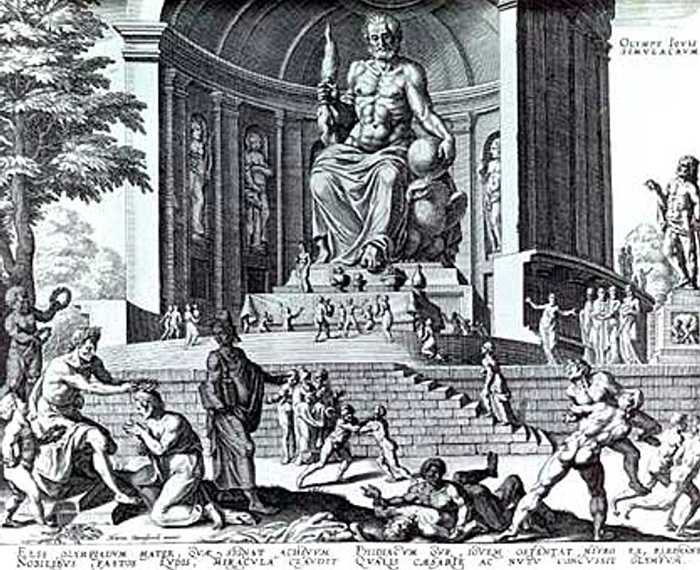
Statue of Zeus at Olympia [5]
One thing all that reading made clear to me was that most ancient cultures came no closer to understanding the mystery of the Divine Nature than depicting “God” in the form of carved images made, as the book of Romans states, “to look like mortal man and birds and animals and reptiles…” It is as if an automobile carburetor were to decide that the being who made it must look like a piston, or a crankshaft, or like the carburetor itself—assuming a carburetor can think, a rather iffy proposition! Yet how many people in history have created “gods” in their own image or, as Romans describes, how many of us have “worshipped and served created things rather than the Creator” Himself?
Have you ever noticed how Greek the Greek “gods” appear, or how Viking the Norse “gods” look? And the closest the Egyptians could come to eternal life was to spend weeks chemically preserving the bodies of dead Pharaohs—a process whose gruesome results did nothing to annul the ancient truth about man recorded in Genesis 3, “For dust you are and to dust you will return.” (Genesis 3:19) No wonder the Lord declared through the prophet Isaiah,
Remember the former things, those of long ago;
I am God, and there is no other;
I am God and there is none like me.
I make known the end from the beginning,
from ancient times, what is still to come.
I say: My purpose will stand,
and I will do what I please.” (Isaiah 46:9-10)
And again, in Psalm 96, “For all the gods of the nations are idols, but the Lord made the heavens… He will judge the world in righteousness and the peoples in his truth.” (Psalm 96:5, 13)
It is easy to laugh at the ignorance of early cultures. Yet modern society, with all its increased knowledge, is not much wiser about who made us or why we are here. To quote Steven Weinberg, an American theoretical physicist, “The more the universe seems comprehensible, the more it also seems pointless.”[6] As a matter of fact, if there were no God, if we really were nothing but an accident, then our existence would be pointless! We would then be nothing but a collection of bacteria sitting on the surface of a tiny ball of dust and water which will soon pass away.
At a school where I used to teach, two teachers were asked to address the entire school at an assembly early in the academic year. I talked about the earth as gift given by a Creator who expected us to care for, and not to destroy the environment He so carefully devised as our home. The biology teacher who spoke next was an atheist and stated to all present that it made no difference what we did to our environment. If we destroyed it, we would be destroyed. But then, some other more adaptable organism would replace us—maybe a rat, maybe a cockroach. In his view, it made no difference!
In fact, if there is no Creator, no Designer of the universe, no Maker with an express purpose in mind for mankind, then what happens to us—or what we do to others—is ultimately of no consequence. Responding to those in his day who claimed that there was no resurrection of the dead, no such thing as eternal life, the Apostle Paul stated in his first letter to the Corinthians, “If the dead are not raised, ‘Let us eat and drink, for tomorrow we die.’” (1 Corinthians 15:32)
The Bible declares, however, that God is real, and that He had definite purposes in creating the universe. To quote from Isaiah,
“For this is what the Lord says—
he who created the heavens,
he is God;
he who fashioned and made the earth,
he founded it;
he did not create it to be empty,
but formed it to be inhabited—
he says:
“I am the Lord,
and there is no other....”
“Turn to me and be saved,
all you ends of the earth;
for I am God, and there is no other….
Before me every knee will bow;
by me every tongue will swear.”
(Isaiah 45:18, 22, 23)
The Scriptures also state, “For I am God, and not man—the Holy One among you…” (Hosea 11:9) Though He made men and women in His own image, people have ever since distorted His image in their ignorant attempts to create “gods” in their own image. It is not we who created God, but God who created us, though many today, especially in the universities, refuse to acknowledge that fact.
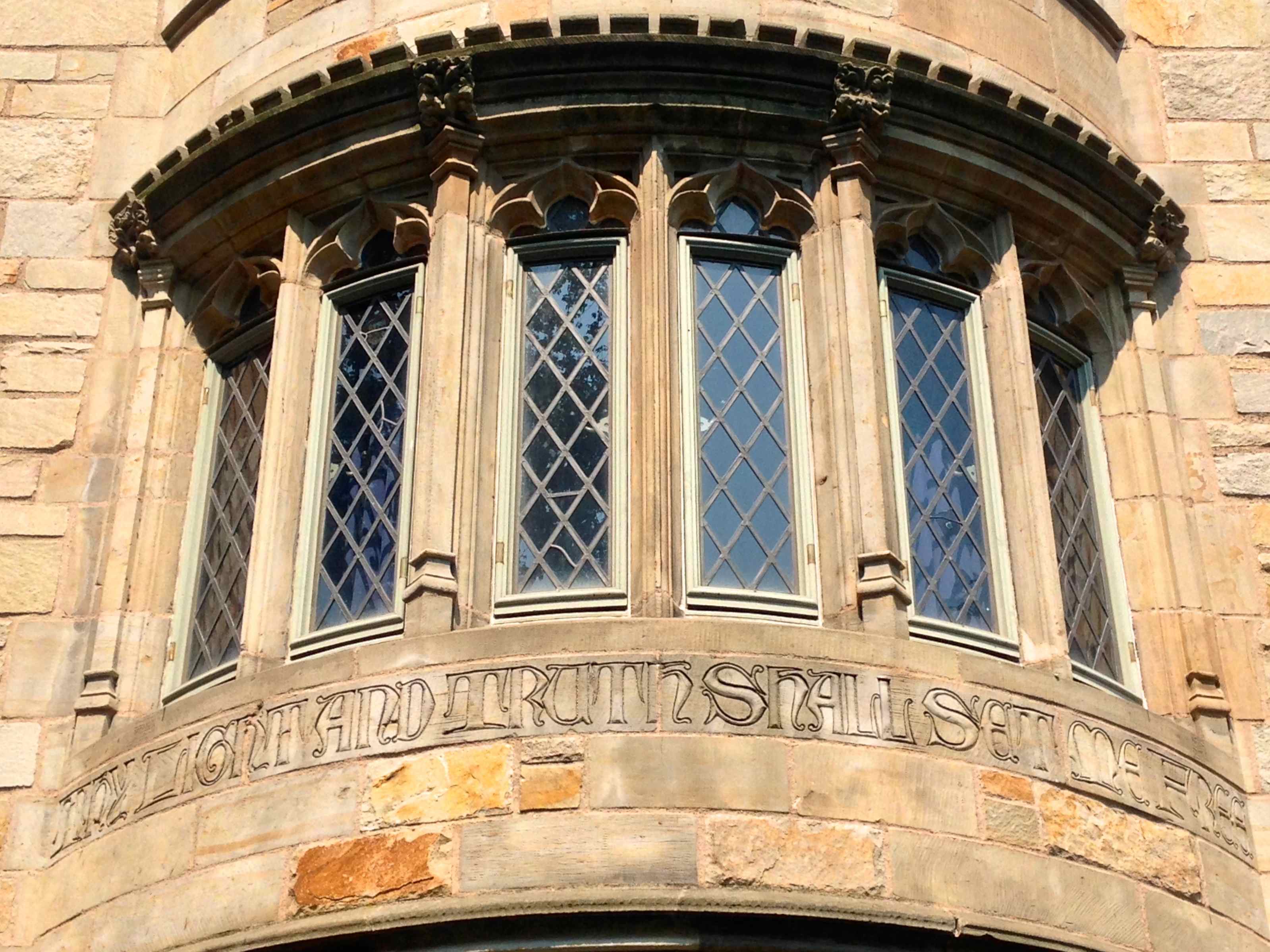
“Thy light and truth shall set me free.” (Yale University) [7]
A few months ago, I was reading the Yale Alumni magazine when I came across an article about a scientist who claimed to have made a great breakthrough. He was studying RNA, ribonucleic acid, a key chemical in our genes, and its role in evolution when he claimed to have discovered a major mechanism in the development of higher organisms. RNA in his view became a “thief” and learned to steal from other molecules, thus taking a pre-eminent role in the development of life! The thought that immediately came to mind was, “RNA a thief? You are talking about chemicals! You might as well talk about a piece of wood becoming a thief!” To quote again from the more balanced perspective of this week’s New York Times article on RNA, “The concept of the RNA world is also unproven in its central assertion, that an RNA molecule could catalyze its own replication… Chemists like David P. Bartel of the Cambridge Institute in Cambridge, Mass., have been trying to construct RNA molecules… ‘No one has come close to getting a self-replicating RNA,’ Dr. Bartel said.”
If we will not acknowledge the existence of the Creator, we are left searching among the dust of what was created to explain how the universe made itself! To give you another example, think for a moment, who is Mother Nature? Does anyone in this room really believe she exists? Isn’t this just a euphemism we use because we prefer not to acknowledge the wisdom or the work of the God who made us? For that matter, how is Mother Nature any different than Santa Claus? A secular modern world finds the Christ of Christmas most inconvenient, and Santa Claus most convenient as an innocuous replacement for the Savior who offends our sensibilities. Mother Nature is a similarly convenient secular substitute for the God we neither want to acknowledge or deal with. Mother Nature and Santa Claus are far easier to handle than a God whom the Bible describes as a “consuming fire,” a God who knows everything we have ever said or done—and who will one day call us to account for it. No, “gods” made in our own image will ever call us to account for anything!
In the late 1980’s, when two dear friends who are now doctors were pre-medical students at Yale, they took a required Chemistry course. Early in the year, the professor told the class an allegorical story. If you walked through a large desert and saw only sand for mile after mile but then, after a long time, you came across a beautiful watch lying on the ground, what would you assume? Students gave various responses, none of which satisfied the professor, so he gave his own answer. He stated that you would immediately assume that someone had made that watch, especially since, unlike the sand, it was intricately designed. He then stated that the universe is infinitely more complex than the finest watch—but that nevertheless it has no designer! He concluded that it is only the accidental result of a process with no higher intelligence behind it. Some of his students were puzzled to say the least, which is why I heard about the incident. As Winston Churchill once said, “…man will occasionally stumble over the truth, but usually manages to pick himself up, walk over or around it, and carry on.”[8]

Wings of a common house fly [9]
A couple of years later, one of those students called me after developing pictures from an electron microscope of the wing of a common housefly. He first commented that you or I would swat such an insect without ever giving it a second thought. Yet gazing at the intricacy and beauty of the fly’s wing, and the elegance of the structure that connected it to the fly’s body, he was awestruck by the care the Creator took in making such a common creature. Psalm 19 states, “The heavens declare the glory of God; the skies proclaim the work of his hands…” But did you ever stop to think how much more intricate a fly’s wing is than the wing of an F-15 fighter?
And if God took such care with a fly’s wing, what about the human eye? How did such a complicated structure come in to being if no one made it? The finest Swiss watch is a child’s toy compared to the intricacy of the human eye. Even Charles Darwin admitted in his book, The Origin of the Species, however suspicious his motivation for so admitting may be: “To suppose that the eye with all its inimitable contrivances for adjusting the focus to different distances, for admitting different amounts of light, and for the correction of spherical and chromatic aberration, could have been formed by natural selection, seems, I freely confess, absurd in the highest possible degree.”[10]
To the stubborn blindness of human unbelief, the Psalms ask two questions. “He who planted the ear, shall He not hear? He who formed the eye, shall He not see?” (Psalm 94:9, NKJV) The concept that the eye formed itself over long stretches of biological time falters on the fact that almost all creatures—whether found in fossils or in oceans or jungles—have eyes. How long then were all creatures blind and eyeless until at last they could see, and where is that biological record to defend even slightly that absurdity?
To return to The New York Times article from January 26th, entitled “Superclusters of Galaxies Shed New Light on Cosmic Architecture”:
Stars, galaxies of stars and clusters of galaxies, these are the more familiar members in the hierarchy of structure in the universe.
But there are things much, much bigger: superclusters, agglomerations of galaxies and galaxy clusters that stretch across millions
of light-years of space.
You or I could never begin to number the stars. My 7-year-old who loves math asked me recently, “Daddy, what is the biggest number?” He could not accept the fact that there is no biggest number, and so he kept asking. Then one day he declared, “Well, if there is a biggest number, it must be made up of all nines!” We cannot measure the infinite, yet the Bible says of God, “He determines the number of the stars, and calls them each by name.” (Psalm 147:4) No wonder the Psalmist wrote long ago, “When I consider your heavens, the work of your fingers, the moon and the stars, which you have set in place, what is man that you are mindful of him, the son of man that you care for him?” (Psalm 8:3-4)
Several years ago, when I was going through a long series of surgeries and physical therapy to restore my ability to walk, there was a particular day when I was tempted to give up the fight. It wasn’t worth it, or so I thought. That night, I found myself leaning on crutches outside the driveway gate of the house where I live gazing up at the clear, dark sky. With a multitude of stars twinkling above and the moon shining radiantly, I was struck by how small I was, but how great God is and, especially how much greater He is than all my little problems. God hadn’t changed, it was I who had changed—and let go of hope! Looking up at that night sky, I asked the Lord to restore hope in me.
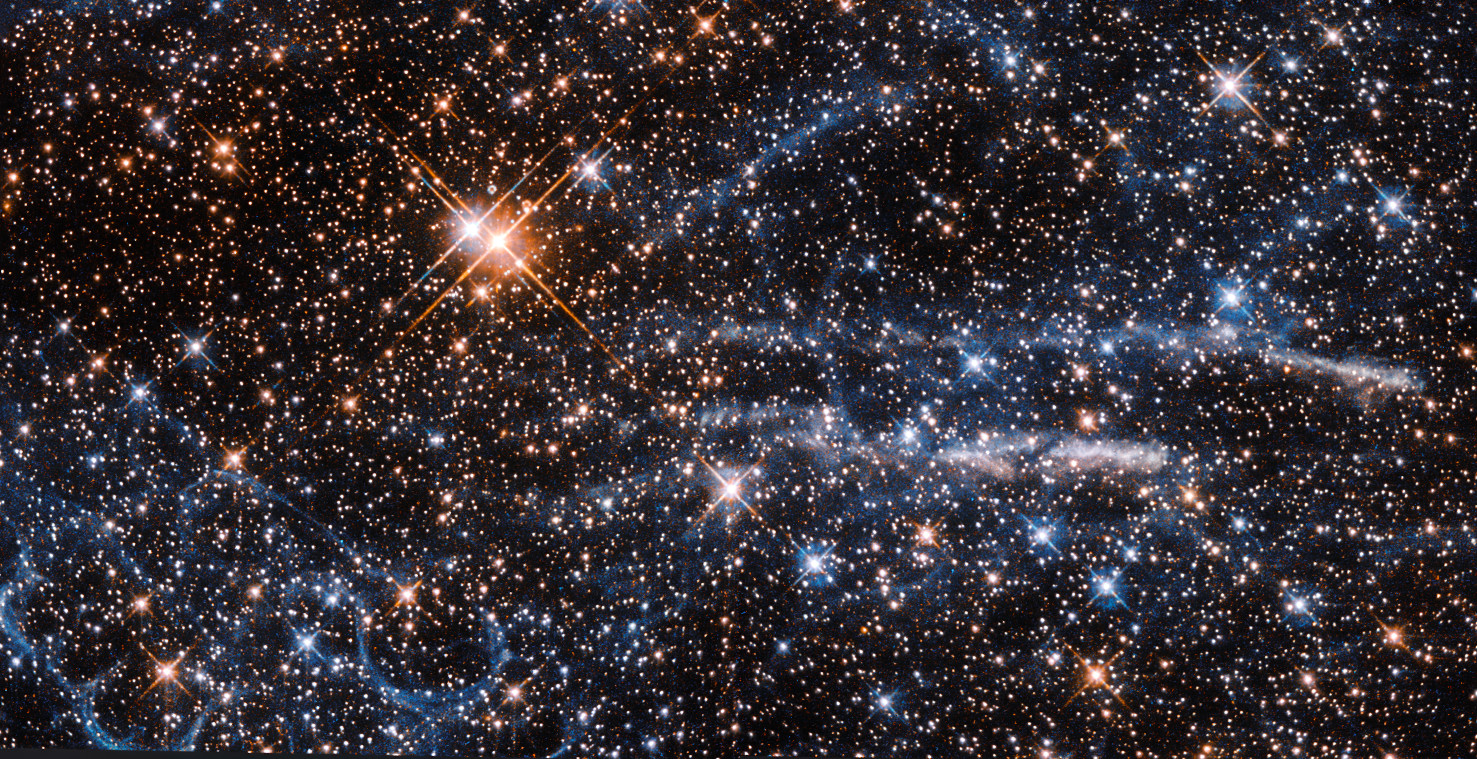
The Honeycomb Nebula (NASA) [11]
Who are we that we think we are so great? How could we ever think that “mind is the measure of the universe,”[12] the human mind that is? To again quote from Winston Churchill: “Some of my cousins who had the great advantage of University education used to tease me with arguments to prove that nothing has any existence except what we think of it... These amusing mental acrobatics are all right to play with. They are perfectly harmless and perfectly useless.”[13] Yet men and women who claim to be wise play such mental games every day. Does looking through a telescope really make us so wise, or should we instead be humbled seeing the vastness of space?[14]
For that matter, do we really think that we are going to find God through a telescope? Do we really think that the Almighty can be found out using test tubes? We may learn much that is useful about Creation, but we will never find the Creator by these means. The prophet Isaiah wrote, “Truly you are a God who hides himself, O God and Savior of Israel.” (Isaiah 45:15) Unless the Creator chooses to reveal Himself to his Creation, including created beings such as us, we are too limited to understand the true nature of the One who made us. We can only understand God when and as He chooses to reveal Himself to us. Listen for a moment to the Apostle Paul:
For it is written:
“I will destroy the wisdom of the wise;
the intelligence of the intelligent I will frustrate.”
Where is the wise man? Where is the scholar?
Where is the philosopher of this age? Has not God made foolish the wisdom of the world?
For since in the wisdom of God the world through its wisdom did not know him,
God was pleased through the foolishness of what was preached to save those who believe.
Jews demand miraculous signs and Greeks look for wisdom, but we preach Christ crucified….
Christ the power of God and the wisdom of God. For the foolishness of God is wiser than
man’s wisdom, and the weakness of God is stronger than man’s strength. (1 Corinthians 1:19-25)
We human beings can barely begin even now to step a little beyond the limits of our tiny home in space, but God can and has stepped into the bounds of our little world.
As the book of Job states, “God is mighty, but he does not despise men….” (Job 36:5) John wrote in his Gospel that the One “through whom all things were made” became a man and walked among us. Jesus looked like us, walked like us, ate like us, and slept like us, yet he could say, “I tell you the truth, before Abraham was born, I am!” (John 8:58) This is the one of whom the Scriptures declare, “The Lord brought me forth as the first of his works, before his deeds of old; I was appointed from eternity, from the beginning, before the world began…. before he made the earth or its fields or any of the dust of the world, I was there when he set the heavens in place….” (Proverbs 8:22-27)
John also wrote, “He was in the world, and though the world was made through him, the world did not recognize him…. Yet to all who received him, to those who believed in his name, he gave the right to become children of God.” (John 1:10, 12) God created us, but we are not at present in right relationship with Him. We are not born children of God. What we call human foibles and failings, God calls sin—sin that He must and will judge. What does the Bible mean by the word sin? Hatred, strife, lust, envy, jealousy, gossip, murder… all things to which we fallen human beings are no stranger:
“So listen to me, you men of understanding.
Far be it from God to do evil,
from the Almighty to do wrong.
He repays a man for what he has done;
he brings upon him what his conduct deserves….
Who appointed him over the earth?
Who put him in charge of the whole world?
If it were his intention
and he withdrew his spirit and breath,
all mankind would perish together
and man would return to dust.” (Job 34:10-15)
But it is not God’s will that we perish, or He would not have sent His Beloved Son to die in our place on the cross. We can, if we so choose, insist on bearing the consequences of our sin ourselves. Or we can believe that Jesus the Son of God came from heaven to earth to take upon His shoulders all my sin and yours, to bear the righteous indignation of an offended God in His own body on the cross. The Son of God never offended His Heavenly Father, but you and I offend all the time. Jesus never sinned, but you and I never cease to sin—until Jesus comes into our hearts to break the power of sin ruling over us. The Son of God died on the cross to transform rebellious human beings into children of the living God. “For God, who said, ‘Let light shine out of darkness,’ made his light shine in our hearts to give us the light of the knowledge of the glory of God in the face of Jesus Christ.” (2 Corinthians 4:6)
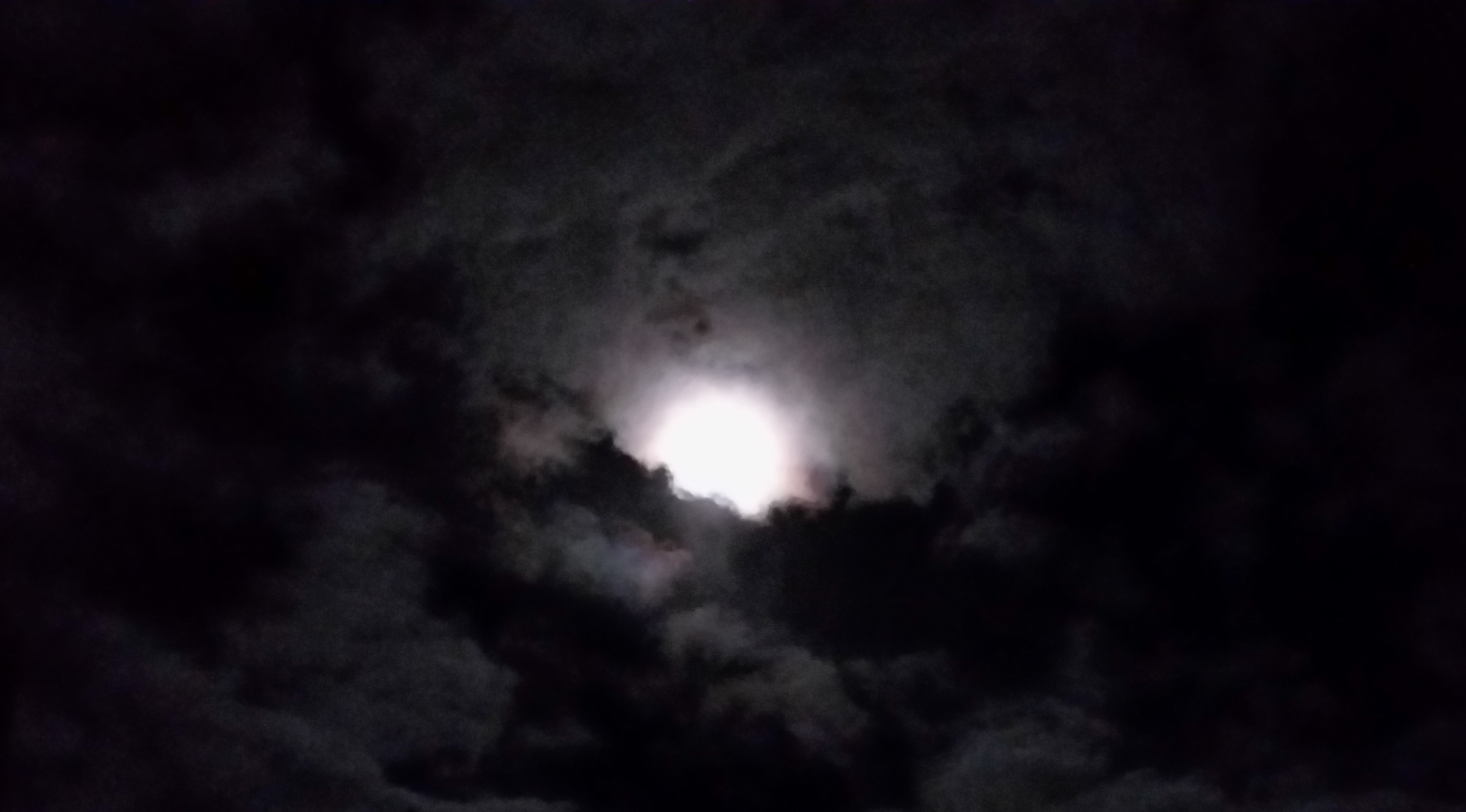
Photo of the moon and sky over Chia, Colombia by Chris White [15]
Do you desire to know tonight the One who made the galaxies? More than that, do you want to know the God who calls the stars by name, yet loves you so much and cares for you so intimately that He knows the number of the hairs on your head? He knows everything you have ever done, and everything you have been through. Jesus said,
“Come to me, all you who are weary and burdened, and I will give you rest. Take my yoke upon you and learn from me, for I am
gentle and humble in heart, and you will find rest for your souls. For my yoke is easy and my burden is light.” (Matthew 11:28-30)
Do you want to know Him tonight as your Savior and best friend, and taste of His love and forgiveness now? Or will you taste His anger later when He comes one day to judge the entire world and make an end of sin and sorrow once and forever?
“For God so loved the world that he gave his one and only Son, that whoever believes in him shall not perish but have eternal life.
For God did not send his Son into the world to condemn the world, but to save the world through him…” (John 3:16-17)
Copyright © 2018 Christopher N. White
From a message given on Saturday, April 10, 1999 at the United Church of Christ in Devon located in Milford, Connecticut.
All Bible references not marked otherwise are from The New International Version, The Zondervan Corporation, 1995. Verses marked NKJV are from The New King James Version, Thomas Nelson, Inc.: Miami, Florida, 1982.
Endnotes:
[1] Photo of the earth and moon from NASA Space Place. url: https://spaceplace.nasa.gov/review/volcanoes/earth.en.jpg (visited 1/27/2018)
[2] Photo of the Milky Way from NASA.gov. url: https://www.nasa.gov/topics/earth/features/2012-alignment.html (visited 1/27/2018)
[3] Photo of ruins in Armero, Colombia by Denise Chen ©2011.
[4] Albert Abraham Michelson, quoted by Peter Coveney and Roger Highfield in The Arrow of Time. London: Flamingo, 1991, p. 67
[5] Statue of Zeus engraving from Wikimedia Commons. Public Domain {PD-1923}. url: https://commons.wikimedia.org/wiki/File:Statue_of_Zeus.jpg (visited 1/27/2018)
[6] Steven Weinberg, The First Three Minutes: A Modern View of the Universe. New York: Basic Books, 1977, p. 154
[7] Photo from Branford College, Yale University. Mark Alden Branch, “Thy light and truth shall set me free,” Yale Alumni Magazine, 8/19/2015. url: https://yalealumnimagazine.com/blog_posts/2193-thy-light-and-truth-shall-set-me-free (visited 1/27/2018
[8] Irving Klotz, “Bending perception, a book review”, Nature, 1996, Volume 379, p. 412
[9] Rennie W. Doane, The Project Gutenberg EBook of Insects and Diseases. url: https://www.gutenberg.org/files/28177/28177-h/28177-h.htm (visited 1/27/2018)
[10] Charles Darwin, The Origin of the Species. New York: Bantam Books, 1999, p. 155
[11] Photo of the Honeycomb Nebula by NASA’s Hubble Telescope. url: https://www.instagram.com/p/BZ9NreNHiLR/?taken-by=nasa (visited 1/28/2018)
[12] George M. McCrie, editor. Further Reliques of Constance Naden: Being Essays and Tracts for Our Times, London: Bickers & Son, 1891, p. 254. URL: https://books.google.com/books?id=VhdIAAAAMAAJ&pg=PA254&lpg=PA254&dq=%22mind+is+the+measure+of+the+universe%22&source=bl&ots=yqWvxYm0Yv&sig=KWvuJM226rg9RQyZaQwMOKKEPx0&hl=en&sa=X&ved=0ahUKEwjZ7c7D9_PYAhVJylMKHfUcAesQ6AEIJzAA#v=onepage&q=%22mind%20is%20the%20measure%20of%20the%20universe%22&f=false (visited 1/25/2018)
[13] Winston Churchill, My Early Life, London: Fontana, 1972, pp. 123-4
[14] In October 2018, I was visiting my son, an undergraduate at Massachusetts Institute of Technology, when the announcement was made that scientists from MIT and CalTech had just witnessed gravity for the first time. My immediate thought was, “And what about the God who made gravity and has known about it all along?”
[15] Photo of the moon and sky over Chia, Colombia by Chris White
From a message given on Saturday, April 10, 1999 at the United Church of Christ in Devon located in Milford, Connecticut.
All Bible references not marked otherwise are from The New International Version, The Zondervan Corporation, 1995. Verses marked NKJV are from The New King James Version, Thomas Nelson, Inc.: Miami, Florida, 1982.

